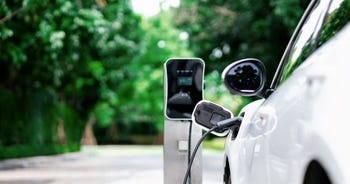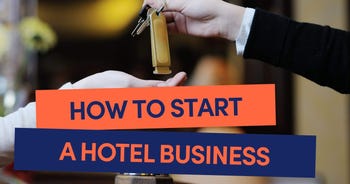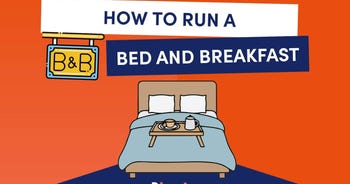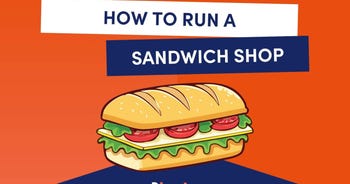What is a business expense? An easy guide to small business expenses
Setting up your business can be exciting, but attempting to wrap your head around it all can be challenging at times.
And, with so many different business expenses, it can be hard to know what you can and can’t claim when you’re simply trying to keep your business moving in the right direction.
To help you alleviate some pressure and understand everything from what counts as a business expense to how to claim them, we’ve put together this handy guide.

What is a business expense?
Business expenses — also known as allowable expenses — are necessary costs that your business will incur as it operates. It can be everything from uniforms to travel costs, stationery to phone bills and more that helps to keep your business running.
These expenses will be deducted from your income when calculating taxable profits which means that you won’t have to pay tax on these items.
What’s the difference between capital expenses and business expenses?
Capital expenses are a larger form of expenditure that’s likely to have a lasting benefit (of over a year) on the business. These expenses can be things like IT equipment, office furniture, rent and business insurance.
Some capital expenditures may qualify for capital allowances, while some can be treated the same as revenue expenditure. Most of your day-to-day expenses can be classed as revenue expenditures such as ink cartridges for your printer.
Are all expenses allowable for tax purposes?
Unfortunately no, not all expenses are allowable for tax purposes. These expenses can be known as ‘disallowable expenses’ and are expenditures that you pay for but cannot be claimed as a tax deduction. These can be everything from business entertainment, networking, fines and penalties and much more.
As a general rule, if you’re unsure what counts as an expense or not, ask yourself ‘has this been incurred exclusively for the purpose of trade’.
What can I claim as a business expense?
Knowing what you can and can’t expense whilst running your business can sometimes be a challenge. Here are some of the most common allowable expenses that businesses will claim back:
1. Travel expenses
These include any costs that are incurred by yourself or your staff when travelling for official visits, meetings or anything of that nature.
Although these expenses can be infrequent, they must be recorded properly in the income statement as travelling expenses.
These can include anything from:
- Fuel — Any fuel consumption used for the journey.
- Parking — Make sure to keep proof of parking such as timed ticket stamps.
- Train or bus fares — Again, keep the proof of purchase for the train or bus ticket.
- Vehicle insurance — If you’ve had to hire a car specifically for the occasion and have to take out insurance, you can claim this, too.
- Hotel rooms or meals on overnight business trips — If you have to pay for a hotel room and attendance is mandatory, then you can claim this back.
You can’t claim for:
- Non-business driving or travel costs — This includes travel between home and work.
- Fines — Any fines or driving penalties that you may receive on your journey.
2. Office, property and equipment
These purchases are made with the intention of improving the office environment and providing staff with the day-to-day necessities they need to do their jobs.
Stationery
You can claim expenses for:
- Electricals — Including, phone, mobile, fax and internet bills.
- Postage — Including mailing bags and postage fees.
- Printing — Including printer ink, printing paper and cartridges.
- Stationery — Including paper, pens, pencils, notebooks and more.
- Computer software — As long as the business uses it for less than two years.
Rents, rates, power and insurance
You can claim expenses for:
- Rent for business premises
- Business and water rates
- Property insurance
- Security
- Utility bills
For any equipment you keep in your businesses — such as printers, monitors and laptops — you can claim these as an allowable expense if you use cash basis accounting — which is where you record when cash is received and expenses are paid in cash — or capital allowances if you use traditional accounting — which calculates your profits based on when you send or receive invoices.
3. Staff costs
Most expenses for staff costs can be claimed back on full-time employees, independent contractors, consultants and freelancers.
You can claim for:
- Salaries
- Pensions and employer’s National Insurance Contributions
- Benefits
- Training courses
You can’t claim for carers or domestic help, including nannies.
4. Clothing
Money spent on clothing that’s required for staff to properly do their job can be claimed back as a business expense.
These include:
- Uniforms
- Required personal protective equipment (PPE)
- Costumes
You cannot claim for everyday clothing, even if you wear it for work.
5. Training courses
You can claim for training that helps yourself or your staff improve the skills and knowledge that are used in your business.
The training courses must be related to your business and they can also include refresher courses.
You can’t claim expenses for training courses that help you:
- Start or set up a new business.
- Expand into new areas of business, including anything related to your current business.
6. Legal and financial
One of the more tricky aspects of business expenses, it can be hard to know what you can and can’t claim when it comes to legal and finance.
Accountancy, legal and other professional fees can count as an allowable business expense.
You can claim for:
- The hiring of accountants, solicitors, architects and surveyors but only for business reasons.
- Professional insurance premiums.
You can’t claim for:
- Legal costs for buying property and machinery. However, if you use traditional accounting, you can claim these costs as a capital allowance.
- Fines for breaking the law e.g speeding tickets and parking fines.
7. Bank, credit card and other financial services
You can claim for:
- Bank, overdraft and credit card charges
- Hire purchase interest
- Leasing payments
- Interest on bank and business loans
- Alternative finance payments — For example, Islamic finance which is a way to manage money that keeps within the moral principles of Islam.
You can’t claim for repayments of loans, overdrafts or finance arrangements.
8. Marketing, entertainment and subscriptions
When it comes to marketing your business, there are a few expenses you can and can’t claim for.
You can claim for:
- Bulk mail advertising — This is where you send out information about a new product, invite people to a product launch and encourage promotional offers.
- Free samples — Giving out free samples of your product to members of the public either in-person or through purchased orders.
- Advertisements in newspapers or directories — To spread the word about your business, product or service.
- Website costs — Including hosting fees and domain registration.
You can’t claim for:
- Entertaining clients, suppliers or customers
- Event hospitality
9. Subscriptions
You can claim for:
- Trade or professional journals
- Trade body or professional organisation memberships as long as it’s related to your business
You can’t claim for:
- Payment for political parties
- Gym membership fees
- Donations to charity
10. Business energy
If your business is VAT registered, then you can claim back in full the VAT you pay on business gas and business electricity. To find out more, check out our guide to VAT on business energy.
What are simplified expenses?
Simplified expenses are three different types of expenses where you claim a flat-rate allowance for the expense rather than the actual total cost or a portion of it.
The three different types of simplified expenses are:
- Working from home — You can claim a portion of your household expenses such as council tax, water rates, rent and mortgages, and heat and light when you work for yourself from home.
- Living in your business premise — If you live in your business premise (for example, if you run a guest house and live on-site), you can use the flat rate adjustment to calculate your personal expenditure. This flat rate will then be deducted from the business's actual costs.
- Business mileage costs — Similar to home expenses, you can claim back mileage expenses at a flat rate.
| Vehicle | 2022/23 Amount per business mile |
| Cars and goods vehicles for the first 10,000 miles | 45p |
| Cars and goods vehicles after the first 10,000 miles | 25p |
| Motorcycles | 24p |
| Bicycles | 20p |
These flat rate allowances were designed to make it easier for those who are self-employed or in partnerships — where all partners are individuals — to keep business records in line and prepare for tax returns.
You can find out more information about tax returns for your small business with our handy guide.
How do I claim a business expense?
Claiming a business expense is easy, whether it’s for parking, printer ink or legal fees you’ll need to:
- Keep all records as proof of your costs such as receipts and invoices. Make sure that the date and the total amount are visible on each.
- Add up the total for the end of the tax year.
- Include this total amount in your Self-Assessment Tax Return.
You won’t need to share any proof with HMRC until you’re contacted and specifically asked to do so.
Sorting your business finance with Bionic
The world of business expenses can be complicated, especially when you’re just starting out. Whether you’re looking to understand how to claim business expenses or simply are all expenses allowable for tax purposes, our guide can help keep your business moving in the right direction.
Get in touch today with the Bionic team to discuss your needs or get more information on business finance. We can help cut costs by getting your business essentials sorted.







